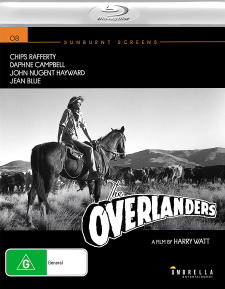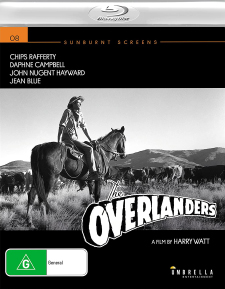Overlanders, The (Blu-ray Review)

Director
Harry WattRelease Date(s)
1946 (September 1, 2021)Studio(s)
Universal Pictures (Umbrella Entertainment – Sunburnt Screens #8)- Film/Program Grade: B-
- Video Grade: C
- Audio Grade: B-
- Extras Grade: B+
Review
[Editor’s Note: This is a REGION-FREE Blu-ray release.]
The Overlanders is a 1946 Western adventure set in the Australian Outback, produced during World War II, but released afterward. It was actually a British production from Ealing Studios, filmed entirely on location in Australia. Written and directed by Harry Watt, it opens with a newsreel-style explanation of the threat posed by the Japanese pushing south through the Pacific Ocean toward Northern Australia. (The fact that the narration bemoans that Northern Australia had a million head of cattle, but a population of “only 5000 whites,” is a sad reminder of how the indigenous population wasn’t even counted by the British when they surveyed the continent.) To avoid the chance of leaving resources for the Japanese if they tried to invade, a group of drovers including Dan McAlpine (Chips Rafferty) set out to lead a massive herd of cattle nearly 2000 miles from Wyndham to safe pastures north of Brisbane.
Watt had a background in documentary filmmaking, so he took full advantage of the rugged locations, with the actors doing their own stunts. (Rafferty later said that Watt was ruthless when getting the shots that he wanted). All of that gives a genuine feeling of authenticity to The Overlanders, and even the inexperience of some of the actors works in the film’s favor—they seem like real people who have been brought onto the set, rather than just performers.
The Overlanders was a major hit in Australia, and also did well worldwide. It’s far from the first Australian Western, but its success helped open the door for more international productions to be shot in Australia, and it’s a prime example of the genre that would come to be known as “meat pie” or “kangaroo” Westerns. It also made a star out of Chips Rafferty, who stayed active until his untimely death in 1971. The Overlanders remains one of his most memorable roles, as well as a worthy epitaph for his entire career.
Cinematographer Osmond Borradaile shot The Overlanders on 35 mm film using spherical lenses, framed at 1.37:1 for its theatrical release. There’s no information available regarding the master that Umbrella used for their Blu-ray version, but the elements do show signs of their age. There’s an abundance of scratches, frequent density fluctuations, and even instability. The silver lining to those defects is that digital clean-up tools haven’t been applied globally, so the fine detail and grain have been left intact. Contrast and black levels are fine, with a decent amount of shadow detail. Short of a frame-by-frame restoration, which is unlikely for a film like this, it’s probably for the best that the flaws were left alone.
Audio is offered in English 2.0 mono DTS-HD Master Audio, with optional English subtitles. It’s fairly robust for a vintage mono track, with clear dialogue and minimal signs of damage. The lively score by classical composer and music teacher John Ireland was the one and only feature film credit for a man who counted the likes of Benjamin Britten among his students.
Umbrella’s Region-Free Blu-ray of The Overlanders is #8 in their Sunburnt Screens line. The insert is reversible, with one side omitting the mandatory Australian “G” classification from the front cover artwork, and also substituting the theatrical poster art for the back cover blurb. The following extras are included:
- Audio commentary with Stephen Vagg
- The Cattle Story (Upscaled HD – 10:10)
- Original Theatrical Trailer (HD – 2:19)
- Stills Gallery (HD – 107 in all – 8:58)
- Kangaroo (Upscaled HD – 83:46)
- Kangaroo Audio Commentary with Stephen Vagg
Screenwriter and film historian Stephen Vagg describes The Overlanders as his favorite Australian movie of all time, even though it’s technically a British production. Ealing Studios made the film at the behest of the Australian government, as they felt that Australia’s contribution to the war effort hadn’t been recognized enough. Australian film production had largely ceased during the war, so they turned to the British for help (Vagg notes that Australians generally felt like they were still a part of the British Empire at that point). Vagg relates the history of the production including where it fit into the history of Ealing Studios and the Australian film industry in general. He gives biographical details about all of the actors in the film, including the indigenous ones, with a natural emphasis on star Chips Rafferty. Vagg devotes some time to writer/director Harry Watt, who was sent to Australia to scout locations first, and then find a story that would fit them. Vagg also discusses the fact that Watt was an unapologetic socialist, pointing out a scene that he calls the socialist heart of the film. Watt wasn’t as interested in making a film about defeating the enemy as he was in showing the world that he wanted to make after the war was over. That proved prophetic, as the war ended while the film was still in production. Overall, Vagg’s commentary enhances the experience of watching The Overlanders, since it can’t be fully appreciated without understanding its historical context.
The Cattle Story is a 1955 educational documentary short subject, directed by Richard Mason. It was produced by the Film Division of the Department of the Interior, for the Australian National Film Board. It’s a look at the cattle industry in Northern Australia, and while it may be a bit quaint, it also provides historical and practical context for the story of The Overlanders.
Kangaroo is a 1952 feature that Lewis Milestone shot in Australia for 20th Century Fox Studios, starring Maureen O’Hara, Peter Lawford, Richard Boone, and Chips Rafferty. It was the first big budget Hollywood production to be shot in Australia. While the film is presented in HD on the disc, it’s an upscaled version of an aging SD master. The image is soft, lacking detail, with heavy crush in all the darker scenes, and aliasing along diagonal lines. While it’s unfortunate that there wasn’t a higher-quality transfer available, there’s not much chance that it will receive a fresh scan and a new master—especially with Fox catalogue titles languishing at Disney right now. The good news is that it does include another great commentary track by Stephen Vagg, who does a nice job of covering the history of this oddball (and somewhat troubled) production.
The Overlanders isn’t a film that’s going to be very familiar today to audiences outside of Australia, but it’s an important part of Australian cinematic history. Thanks to the nice set of extras on Umbrella’s Blu-ray, this is the best way to learn more about it.
- Stephen Bjork
(You can follow Stephen on social media at these links: Twitter and Facebook.)

